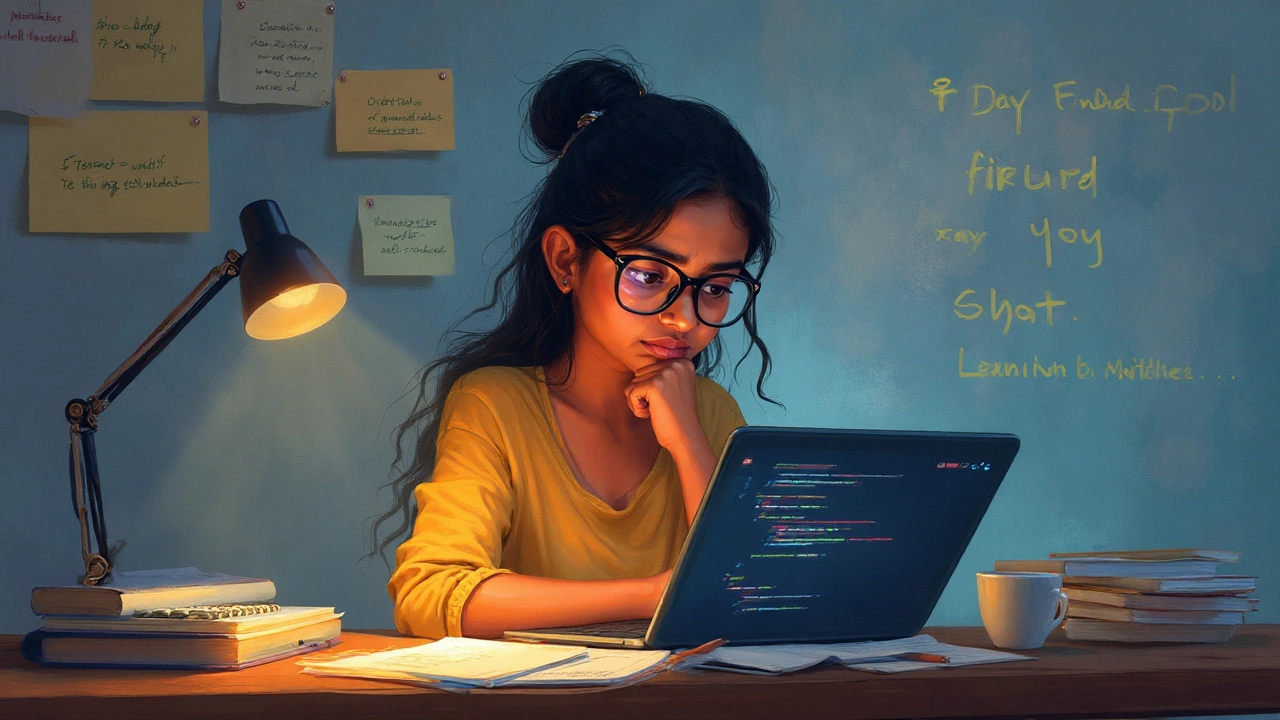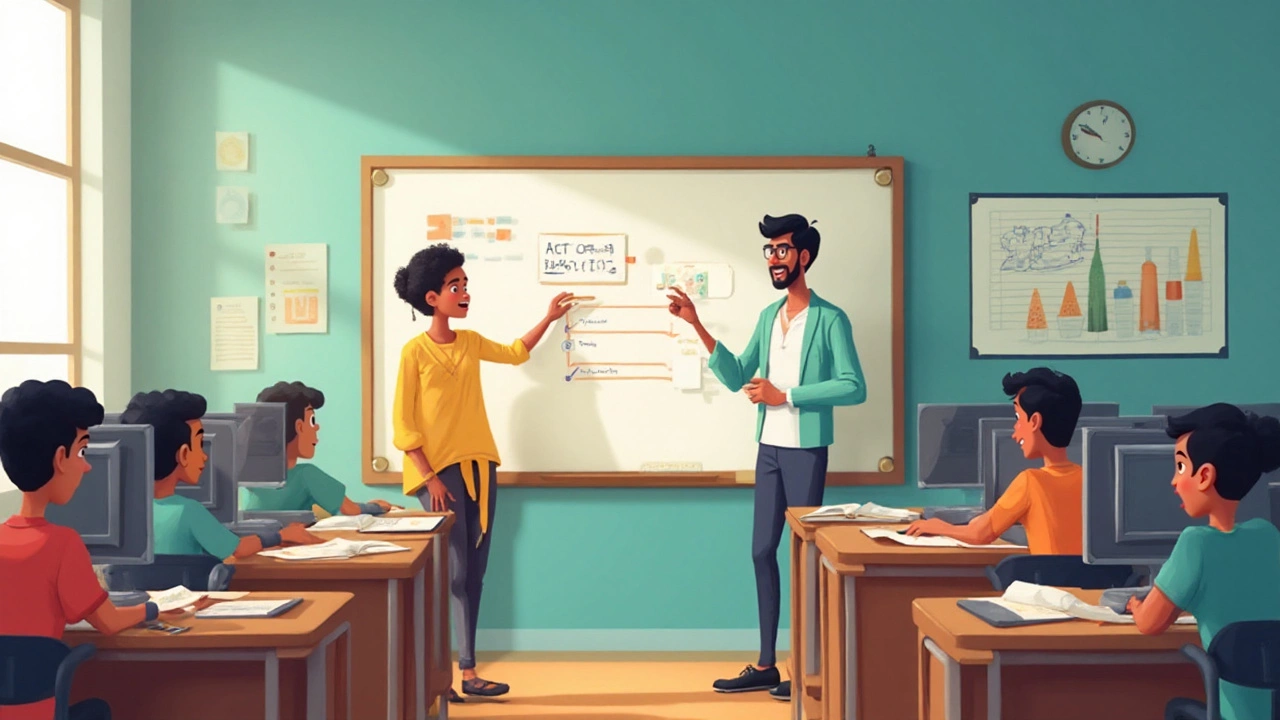
Everyone’s met that person who claims you have to be a genius at maths to learn coding. Or the one who says they “tried learning to code for an app idea” and crashed out before their coffee even cooled down. But is coding actually hard? Here’s a fact: back in 2023, a Stack Overflow survey found that almost 65% of professional developers learned to code before age 18, but a good 35% started later—sometimes much later in life. If that’s not proof anyone can dive in, I don’t know what is. What’s really going on here isn’t a question of intelligence, but a mix of mindset, approach, and, honestly, patience. So let’s break through the mystery and look at what makes coding tricky, what makes it easier, and why you absolutely do not need to be born with a ‘coding brain’. Some people claim to have a “visual memory” or a “logical mind”, but plenty of really successful developers had messy desks, hated maths, and stumbled through their first ‘Hello, World!’ just like anyone else.
What Makes Coding Seem Difficult?
Most people don’t find the hardest part of coding is the code itself. It’s something else: the confusion that comes from staring at a blank screen, not knowing where to start, or getting lost in weird jargon. Think about your first day at a new job or in a new city—there’s a whole language you need to pick up before you start feeling at home. Coding is the same. Syntax (the way code must be written in a specific language) trips people up in the beginning. For example, forgetting a semicolon in languages like JavaScript or Java can break your whole script. Then there’s the overwhelming sea of languages—Python, JavaScript, C++, Rust, and it doesn’t stop. It’s like walking into a bakery and being told you can only pick one cake, but you haven’t tried any of them yet.
So, what about learning styles? Some people work best by reading, others by doing. Coding rewards the ones who aren’t afraid to poke around, throw stuff at the wall, see what breaks, then look up what just happened. I've seen Alisha—my wife—go from thinking ‘code isn’t my thing’ to cracking beginner Python projects, simply by following YouTube tutorials and tweaking them until she got them to work. She didn’t memorize lists of functions—she solved tiny, real problems. One of the hidden challenges is comparing yourself with people who already seem like “naturals.” Truth? Anyone who’s fluent in coding today was awkward at it once. It doesn’t matter if you’re from Wellington or Warsaw—this stuff takes repetition, not raw brainpower.
Another hurdle is frustration tolerance. Debugging (finding and fixing errors) is part of coding life. As a fact, professional coders spend about 50% of their time fixing bugs or refining existing code. There’s a study from GitHub, published in late 2024, showing that the average coder spends 13.5 hours a week just on bug fixes. Imagine playing chess with your laptop, and half the time the pieces just vanish for no reason—that’s what debugging can feel like. But every bug you squash is a chance to learn. Frustration fades once you accept that those errors are really part of getting better. Quick tip: It really helps to write down what you tried and what didn’t work. Not only does this make you more methodical, but it also keeps you from spiraling into doom-scrolling on Reddit after hitting your first big error.
People also worry about “keeping up with technology.” With AI tools like Copilot or ChatGPT now writing chunks of code automatically, it’s easy to feel outdated. This actually can help you as a beginner, though. Getting AI to explain why code works, or having it rewrite your messy function, shortens the feedback loop. You learn faster. People in 2025 are using coding platforms that weren’t even on the map three years ago. The ecosystem moves quickly, but that means more tools, more supportive communities, and lots more free resources than ever before.
| Aspect | Real Challenge? | How to Overcome |
|---|---|---|
| Syntax | Yes | Practice, cheat sheets, code editors with autocompletion |
| Picking a Language | No, most share basics | Start with Python or JavaScript, then branch out |
| Debugging | Yes | Take breaks, use online forums, document your process |
| Comparing to Experts | No | Focus on your own progress, ignore social media ‘show-offs’ |
| Understanding Concepts | Yes | Pair up projects with real-world interests |
| Information Overload | Yes | Stick to one course/resource at a time |

How People Actually Learn to Code
The best way to start learning is to pick one language—any language will do, though most beginners in 2025 go for Python because it reads like plain English and powers everything from web apps to AI models. When I worked through my own crash-course, I realized it’s not about memorizing heaps of stuff at once, but about building projects that matter to you. Beginners who create something simple (like a calculator or a to-do list app) stick with coding much longer than those who just read or watch lectures. If you want to learn faster, try project-based learning. The real payoff comes when you use code to solve a problem you actually care about. I know a guy at a Wellington tech meetup who built a tool to automate his fantasy rugby drafts—was it elegant? Nope. Was it motivating? Absolutely.
Working in small, focused bursts helps a lot, especially for those who juggle jobs, classes, or family. There’s a 2024 Coursera survey that says people who spend 30-45 minutes a day coding (instead of cramming) progress faster and remember more. You don’t need to code for hours. Consistency > cramming, every time. If you hit a roadblock, switch up the way you learn—combine text-based tutorials, video walkthroughs, interactive platforms like LeetCode or Codecademy, and old-school notebooks. Don’t stick with what isn’t working. Another trick: explain what you just coded—out loud, or to a friend, or even your dog. If you can’t say what your loop or function does, you probably didn’t get it yet. Teaching is learning in disguise.
Accountability makes a difference, too. Coding communities online, like Stack Overflow or Discord study groups, offer answers, memes, and support (sometimes in the same thread). Local meetups or hackathons in cities like Wellington attract all kinds—students, pros, retirees who want to help their grandkids with homework. These spaces turn coding into a team sport, not a lonely grind. I once fixed a stubborn bug in a project after a casual chat over burgers with another developer—something about the food or laughter made the solution obvious. My point: real learning is messy and social, not silent and solo.
And don’t skip over the part about typing speed. Hunting and pecking every key slows down the creative process. If you’re serious, spend a few minutes each day on a typing tutor. Once your fingers stop tripping, your code flows faster and you think more about the ‘what’ than the ‘how’. The same applies for getting comfortable with your text editor—pick one (VS Code is popular with beginners) and learn its shortcuts. Then automate boring stuff, like creating new files or formatting code. The faster you get the dull bits done, the more energy you have for actual learning.
Another thing nobody talks about: learning to read code is just as important as writing it. On GitHub, people pick up a new language just by tinkering with public projects—copying, pasting, and breaking things (in a good way). At first, it’s mysterious, but the more different people’s code you see, the clearer the patterns become. You’ll run into strange variable names or comments in broken English. Don’t sweat it. Grab ideas, see how others solve real problems, and you’ll start noticing shortcuts, better ways to do things, and the mistakes to avoid. Think of it like jamming with a band instead of playing scales solo in your room.

Tips to Make Coding Easier in 2025
The tech world has practically engineered the learning curve down to something much friendlier these days. Back in 2013, online tutorials were scattered and confusing, and support was hit-or-miss. Fast forward to 2025—there’s a ton of free stuff tailored for every background, every age, and every device. Here are some solid tips (I wish I’d had these when I started):
- Start with Python if you want a gentle entry. It’s used by Google, NASA, and Instagram, and it opens doors to AI, web development, and automation.
- Give interactive platforms a go—freeCodeCamp, LeetCode, and Codecademy are top picks. You’ll make mistakes in a safe space and get instant feedback.
- Set clear goals: “Build a weather app,” “Automate my grocery list,” or “Write a simple game.” Your brain likes projects more than abstract exercises.
- Join online coding groups or Discord servers that help beginners. Answering someone else’s questions cements your own understanding.
- Embrace Copilot, ChatGPT, or similar AI tools. Use them to explain errors, write templates, or double-check your logic—but don’t let them do all the thinking for you.
- Document your journey. Notes, blogs, or even quick voice memos help track what works and what needs more practice (and help you stay sane).
- Take brain breaks—coding marathons lead to burnout and missed bugs. A brisk stroll around your neighborhood or a chat with friends works wonders.
- If you get stuck, ask questions—don’t stew in silence. Stack Overflow’s silly questions section is proof that everyone hits walls, even seasoned devs.
- Don’t chase every new tech trend. Pick one stack and stick with it until you’re comfortable.
- Celebrate wins, even the tiny ones. Solved a tricky bug? Finished your first project? Brag about it, even if it’s just to your dog, parents, or partner.
For those looking to land a job or freelance gigs, companies are increasingly focused on practical skills over degrees. According to Hired’s 2025 global survey, 74% of tech employers now care more about portfolios and GitHub contributions than university transcripts. Showcasing what you’ve built—even if it’s just small tools—often leads to callbacks, interviews, or collaborations faster than another certificate course. In Wellington and similar tech hubs, bootcamps and study groups are filled with career switchers, ranters, quietly confident coders, and complete newbies. If they can make it work, why not you?
The bottom line? Coding’s got a steep first hill, but most of the obstacles are in your head or your habits, not your ability. Start simple, practice regularly, make your own learning playlist, and don’t let the myths or posers throw you off. Coding isn’t reserved for 13-year-old prodigies or maths wizards—it’s for anyone willing to tinker, test, and not take their mistakes personally.
Once you send your first script out into the wild, crash a few programs, or make your own weather bot tell you it’s going to rain frogs, you’ll know: coding isn’t hard to learn, it’s just a different kind of puzzle. And every solved puzzle unlocks something new—in your career, your hobbies, and maybe even how you see the world.
More Articles

Why NV Sir Joined Byju's: The Real Reason India's Famous Physics Teacher Made the Move
Dig into why NV Sir, India's iconic Physics teacher, left his coaching legacy to join Byju's. Explore his journey, the facts, myths, and how this move impacts students.

Unlocking Government Employment: Essential Tips and Insights
Navigating the path to securing a government job can be a daunting process, filled with challenges and competition. This article offers valuable insights into the hiring practices of government agencies. Readers will learn about the essential qualifications and skills needed to stand out in the application process. Additionally, practical tips will be provided to improve one's chances of successfully securing a government position. Understanding the intricacies of government hiring can significantly boost an applicant's confidence and capability.

